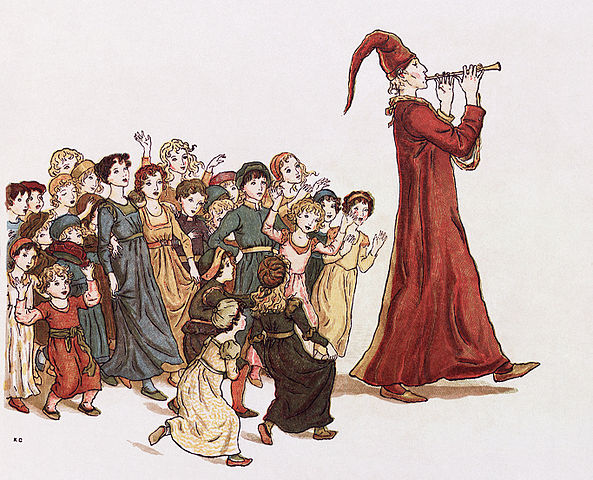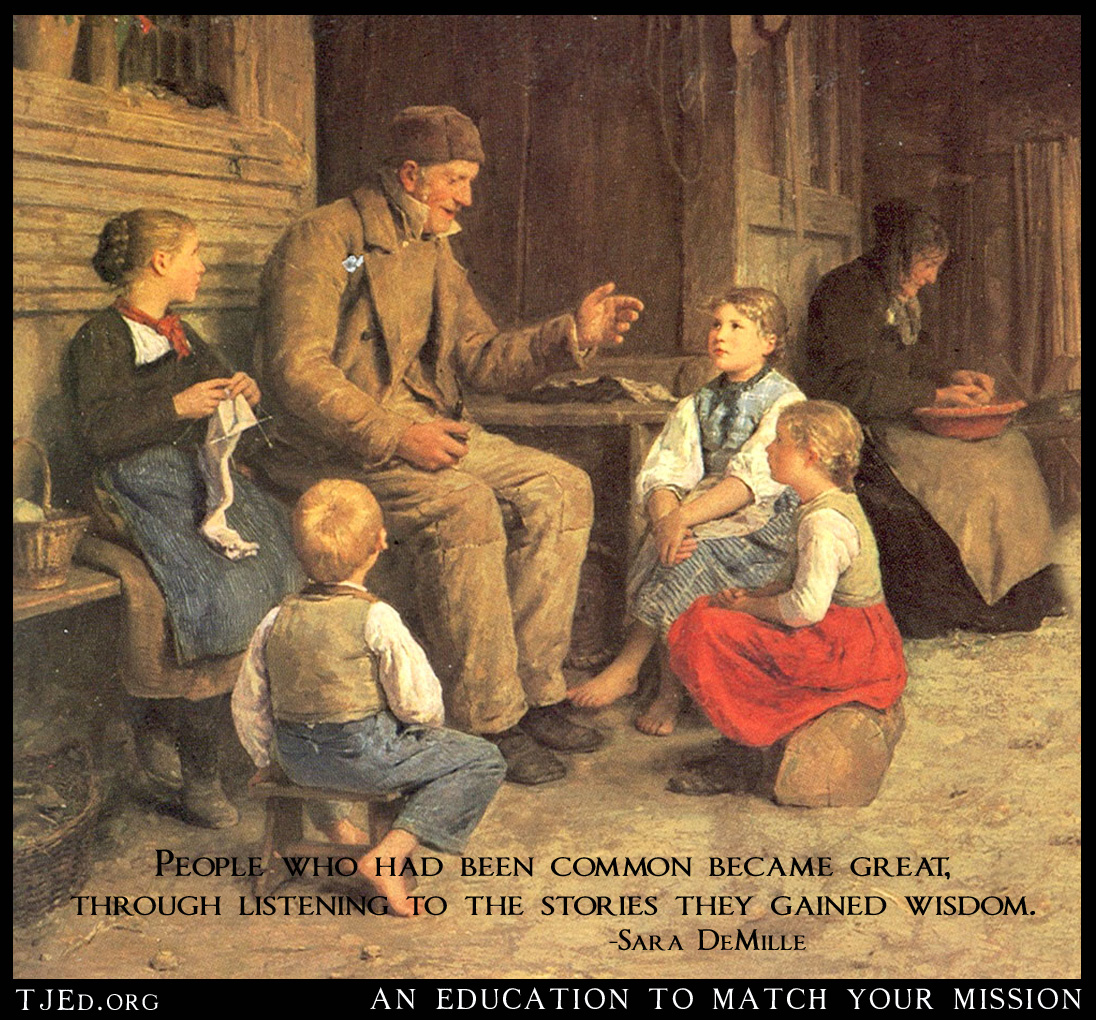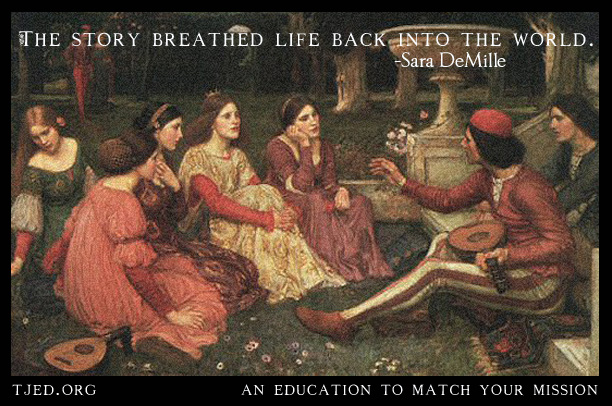Behind and In Front of the Times
 The great Roman thinker Virgil has a lot to teach us. Most people don’t really read Virgil very often these days, or think about his suggestions, and that’s a shame.
The great Roman thinker Virgil has a lot to teach us. Most people don’t really read Virgil very often these days, or think about his suggestions, and that’s a shame.
I know, I know… When someone tells you that we all really need to learn a lot from the ancient philosopher Virgil, you have to start wondering what’s actually happening. Are you being punk’d? Are you on some hidden camera reality show? Or are you experiencing the misfortune of suddenly finding yourself conversing with someone so behind the times that he doesn’t even know he should be spouting Star Wars, Dr. Who, or Downton Abbey?
Virgil? Are you kidding me? Who talks about Virgil nowadays?
Is this for real?
Actually, it is. Virgil had a lot to say that is directly relevant to our current world, societal, and family challenges. He lived at a time that Rome was the most powerful nation in the world, but he understood from the trends, cycles, and current events that the great superpower of his era was in serious decline—even though most people in the establishment didn’t want to admit it.
So he wrote about how his powerful nation could reverse the decline and get back on track. Win back its freedoms and virtues. Be the kind of example everyone in the world would want to follow. Reboot its morals, families, educational system and spread prosperity and principles.
Sound familiar?
Of course, Rome didn’t listen much. But Virgil’s writings remain. The American founders saw them as a timely commentary on the coming decline of the British Empire, and they acted accordingly. In our day, his messages are incredibly relevant. Let me share just one example.
Four Kinds of Education
As I said, Virgil watched Rome losing many of its freedoms, and he saw how the educational system had a direct impact on this loss. In Virgil’s view, education and learning are based on the interactions of the epic, the dialectic, the dramatic and the lyric.
Now, please don’t do the modern American thing and let your eyes and ears glaze over because I’m using words most people don’t hear every day. There are only 4 such words here, and I’m going to clearly define each of them. And they really do teach us some powerful, excellent things about how to drastically improve education. So here goes:
I. Epic Education
Epic Education means learning from the great(est) stories of humanity in all fields of human history and endeavor, from the arts and sciences to government and history, from math to technology, and from leadership and entrepreneurship to family and relationships. Epic education is education about the great classics.
By seeing how the great men and women of humanity chose, struggled, succeeded, and sometimes failed, we gain a superb epic education. We learn what really matters. The epics include all the greats—from the great books of world religions to the great classics of philosophy, history, literature, mathematics, art, music, etc. Epic education focuses on the great classic works of mankind from all cultures and in all fields of learning.
II. Dialectic Education
Dialectic Education uses the dialogues of mankind, the greatest and most important conversations and debates of history and modern times. This includes biographies, original writings and documents that have made the most difference in the world. It is also very practical and includes on-the-job style learning. Again, this tradition of learning pulls from all cultures and all fields of knowledge. It emphasizes mentoring.
It especially focuses on areas where debating sides and conflicting opponents (from wars and negotiations to courts of law and debating scientists, to arguing preachers and the competing or reactive work of artists, inventors, etc.) came to resolution and taught humanity more than any one side could have without opposition. Most of the professions (law, accounting, medicine, engineering, etc.) use the Dialectic learning method.
III. Dramatic Education
Dramatic Education is that which we watch. This includes anything we visually experience in dramatic form, from cinema and movies to television and YouTube videos to plays, reality TV programs, gaming, etc. In our day, this has many venues, unlike the one or two dramatic forms of learning available in Virgil’s time. There is a great deal to learn from drama in its many classic, modern and current modalities.
 IV. Lyric Education
IV. Lyric Education
Lyric Education is that which is accompanied by music, which has a significant impact on the depth and quality of how we learn. It was originally named for the lyre, a musical instrument that was usually accompanied by a song during a play, poetic or prose reading. Some educational systems still use classical (especially Baroque) and other types of music to increase student learning of languages, memorized facts and even science and math. And, of course, most Dramatic (media) learning is presented with music.
The Current Education Battle
With Virgil’s outline of these 4 kinds of education as our background, let’s remember that the future of education is very much in debate. My reasons for addressing this are:
1) It appears too few people are engaged in the current discussion that will determine the future of education.
2) Even most who are part of the discussion are hung up on things like public vs. private schools, funding, testing, minimum literacy standards, teacher training, Common Core, regulations, credentials, policy, etc.
 Specifically, our current technology has changed everything regarding education, meaning that in the Internet Age the cultural impact of the Dramatic and Lyric styles of learning over the other types threaten to undo American education and the strength of families, freedom, and prosperity. In short, success and freedom in any society depend on the education of the citizens, and when the Epic and Dialectic disappear, freedom soon follows.
Specifically, our current technology has changed everything regarding education, meaning that in the Internet Age the cultural impact of the Dramatic and Lyric styles of learning over the other types threaten to undo American education and the strength of families, freedom, and prosperity. In short, success and freedom in any society depend on the education of the citizens, and when the Epic and Dialectic disappear, freedom soon follows.
And make no mistake: The Epic and Dialectic (classics & mentoring) models of learning are everywhere under attack. They are attacked by the political Left as elitist and against social justice, and they are attacked by the political Right as irrelevant and unnecessary for one’s career.
They are attacked by the techies as old, outdated and at best quaint. They are attacked by the professions as “worthless general ed courses,” and by too many educational institutions and state governments as “useless to getting a job.” But most of all, and this is far and away their most lethal enemy, they are attacked by the simple popularity and glitz of the Dramatic and Lyric (visual and audio, entertainment and interactive media).
I do not believe that the Dramatic, Lyric and other parts of the entertainment industry have an agenda to hurt education or freedom. Far from it. They bask in a free economy that repeatedly buys their products and glorifies their actors, singers, and artists.
Nor are Dramatic and Lyric products void of educational content or even excellence. Many popular movies, television programs, musical hits, other arts, and online sites deliver fabulous educational value – and even celebrate the stories that are traditionally told in the Epic and Dialectic. Songs and movies, in fact, teach some of the most important lessons in our society and many teach them with class, quality and depth. And while they can be valuable, they are not a replacement for the Epic and Dialectic forms.
With all the good the Dramatic and Lyric styles of learning bring to society, the reality is that both free and enslaved societies in history have had Dramatic and Lyric learning. In contrast, no society where the populace was sparsely educated in the Epics has ever been free or widely prosperous. Period. No exceptions.
And in the most free nations of history (e.g. golden age Greece, the golden age of the Roman Republic, the height of Ancient Israel, the Saracens, the Swiss vales, the Anglo-Saxon and Frank golden eras, and the height of freedom and prosperity in the United States, among others), both the Epic and Dialectic (classics and mentoring) styles of learning have been deep and widespread among the regular citizens of the nation.
If we want to remain a free and prosperous society, we must resurrect the use of Epic and Dialectic education in our nation. And only parents are likely to do this.
If at least some parents don’t do it, it won’t get done.
Let’s be clear. As the influence of the Internet and social media spreads, it is going to drastically change education. The Dramatic and Lyric (audio-visual, interactive online, virtual/gaming/e-teaching) are going to grow no matter what else does or doesn’t happen in education. What remains to be seen is whether or not classics (Epic) and mentors (Dialectic) will be relegated to the dustbin of history or resurge to the forefront in the emerging educational systems of the future.
The Consequences
If classics and mentors aren’t a central part of 21st Century education, at least three things will happen:
The gap and division between a small, rich, elite class and the rest of the people will increase.
- North America’s middle class lifestyle will follow trends from elsewhere (families will live in apartments, not houses; few families will own their own cars; nearly everyone will live in large cities; families will choose to have fewer children and become much smaller; taxes will increase considerably; etc.).
- The size and intrusion of government will grow, socialistic programs will spread, and the private sector will drastically shrink.
This is what happened in every society that moved from a balance between all 4 kinds of Virgil’s education to dominance of the Dramatic and Lyric over the Epic and Dialectic.
Today, we must make the choice to resurrect truly quality education. If we make the right choice, we will see education, families, prosperity, and freedom flourish. If not, we will witness the decline of these things. Indeed, we simply must make the right choice.
We must also realize that this is not a choice for the experts. If the educational or political experts make this choice, it will go in the direction of Europe as outlined above, and families will suffer and weaken.
It is time for more citizens and parents to do the things that bring strong families, widespread economic opportunities, renewed freedoms, and will get our nation back on track. As Virgil put it long ago:
Now the last age…
Has come and gone, and the majestic roll
Of circling centuries begins anew;
Justice returns…
With a new breed of men sent down from heaven…
Assume thy greatness, for the time draws nigh
This is real. This is now.
And it all hinges on parents making the right educational choices for their families.
******




































Awesome article! Thanks for the reminder!
Just read this in Hero Education. I don’t see any references. When I googled the 4 words and virgil I didn’t find any link. I have read Georgics and did not find any reference to this. Which of Virgil’s weitings might I read more about this?
Thanks!
Linda
Oliver responds: The ideas (four poetic forms) are found in Georgics and The Aeneid, and almost all other Greek and Roman poets as well. The four terms are used by modern poetic analysts of classical poetic forms to describe these ideas–in Virgil, Horace, and other Greek poetry and plays, but Virgil didn’t use these terms directly. They are a modern model utilized in analysis of the Greek poets. If you google “epic lyric dramatic” you’ll find references to this formation; a few (but not all) add the dialectic to it as well, and some use the term “monologue” as the fourth, or even a fifth. They are Aristotle’s traditional groupings from Poetics, but they are usually translated “rhythm language harmony” and in a different section of Poetics he adds “epic”. Actually, Plato started the conversation, with the three types of speaking (one’s own voice, another’s voice (acting), and a combination of the two (dialogue/dialectic). If I remember correctly, this method of categorization was first used in modern times by Steiner as an outline of Aristotle’s main types of poetry–and applied to the Greek and Roman writers. Virgil used all four categories, but he didn’t invent them or label them as such.